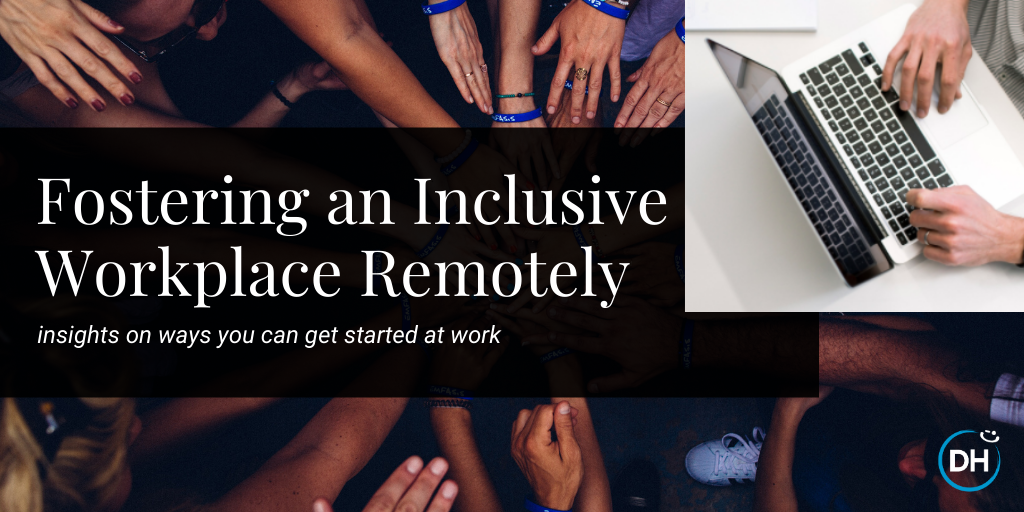
Social distancing does not imply disconnection. It's important to uphold a sense of connectivity with employees.
The absence of seeing smiling faces in the office, having lunch in crowded breakrooms, enjoying potlucks for team celebrations, and simply having direct contact with co-workers is just the beginning of varying changes to the workplace created by this coronavirus crisis. But these factors don't make the idea of social interaction obsolete.
The responsibility for leaders to maintain a connected workforce on the brink of this pandemic hasn't changed, despite the world around us marketing the need
to distance ourselves from each other. Now more than ever, leadership styles must pivot and adapt to this new normal of the virtual workspace.
It's unimaginable what some employees are going through during these tumultuous times which is why it's important to continue to build relationships beyond the physical building.
It's no secret that this pandemic has potentially forever changed the way we work, but it doesn't have to change our commitment to caring about the well-being of the individuals we trust to keep business afloat. Employees still crave the attention of their leaders and want to feel like they matter.
When fostering an inclusive workplace, especially in unprecedented times like these, consider practicing these behaviors to help maintain a culture where employees feel cared for as individuals, as well as connected as a team.
Balance Compassion with Company Survival
While dealing with the new realities of work, the goal should be helping employees figure out solutions to get their job done. Working remotely is a new concept for some people [especially with the blended workforces that are present today], so patience and compassion will be critical elements to fostering a caring workplace culture.
It is understandable that business still needs to thrive to fill a need, but it's equally important to understand that employees might have legitimate reasons to have challenges or struggles while at work. How can you help employees find ways to cope?
Any of these options might prove helpful when balancing the needs of the business with the well-being of the employee.
Trust People to Do Their Job
There's so much angst about working in remote environments with companies worrying if employees will be as productive as they were in the office building. Find ways to measure performance and productivity without insulting the employee through micromanaging tactics that will only make them feel a distrust from their leader.
Review work outputs and attainment of goals to measure productivity. It might also be a good time to review performance expectations and Key Performance Indicators (KPIs) to make sure they align with new expectations. Don't assume people aren't working just because they're working from a home environment.
Be Flexible and Understanding
Be prepared to receive requests that might appear to be a bit out-of-the-box. Everyone may not feel comfortable returning to work as States slowly begin a phased approach of reopening.
Be open to allowing an ease period for employees who request not to return to the office for some time or for employees who disclose having underlying health conditions which makes returning to work more difficult for them.
It might also be beneficial to create a return to work strategy to proactively prepare for employees who might have valid reasons for being unable to return to the workplace but can continue to work remotely.
Developing procedures and protocols to help support the return of employees and ensure healthy workplace conditions show care and commitment to understand and prepare for obstacles employees might face.
If anything, this pandemic has revealed to companies that suddenly, everyone who could work from home, was working from home. Companies were able to be flexible and understanding when society dictated the need to do so. So, it's okay to practice a little flexibility when prepping and preparing for a safe return to work- if that's the direction decided.
Practice Engagement Despite the Distance
Social distancing has presented new ways to engage and interact with an isolated workforce. With most employees working from home, finding ways to meet individual and team needs is a must. Here are some quick ideas that may not take much time, but make a world of difference to employees when established as a workplace routine.
Navigating through this new normal of the virtual workspace will require adjustments and adaptable leadership coupled with compassion. Leaders must be sure to display the necessary traits and behaviors to lead the organization through these challenging times.
It's quite surprising how a person's day can be brightened just by being nice, building trust, and fostering an inclusive work environment where everyone feels valued, respected, and appreciated.

LaShawn Davis has worked for numerous Fortune 100 companies in an HR role, making it her mission to maintain mutual respect in the workplace between employers and employees. She has also founded her own HR consulting company, The HR Plug. As a part of this, she facilitates training/workshops and does public speaking, on the subject of HR and leadership, with her ultimate aim being to get companies to understand and appreciate the value of their employees. You can visit her at www.thehrplug.com